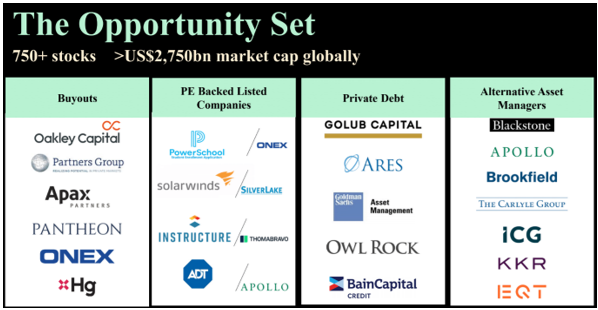Private equity and the liquidity boon for advisers
“Listed private equity can provide investors with private equity returns over the medium term with the benefit of daily liquidity,” said James Brown, portfolio manager at Barwon Investment Partners.
Speaking at The Inside Network’s Alternatives Symposium, Brown extolled the virtue of private equity as a method of ownership that gives investors a real modicum of control.
“Private equity ownership is a superior form of control over a company that can generate greater value for investors in comparison to inefficient listed equity markets,” he said.
When Brown described listed equity markets as inefficient, he explained the equity market beta that measures the volatility of a stock to the market. By being listed and trading daily, equity market beta is unavoidable. Brown said it is that volatility which provides him with the greatest opportunity to outperform.
The portfolio manager broke up the private equity industry into 4 categories. The first is private equity buyouts. “Usually, a listed holding company that has a portfolio of private businesses bought to improve so that they can be sold for a gain,” he said. “Princess Private Equity is a good example of the listed investment company style structure and is managed by Partners Group.”
Brown described the second category, private equity backed listed companies, as public companies with a private equity sponsor controlling the business.
The next two categories came under the private debt realm. “These are US listed vehicles that are issuing hold to maturity private loans to private equity-backed businesses,” he said. “They’re effectively funding the private equity buyout. The listed vehicles pay very nice yields, typically 7-10 per cent on the NAV.
“And finally, there are the alternative asset managers,” he continued. “These are the private equity managers generating fee income [out of] performance fees from the private equity funds they are managing. They usually have a balance sheet of their own investments stapled to that business.”
Using a case study of a listed private equity backed buy-out vehicle, Oakley Capital Investments, he highlighted how the listed London-based firm has a portfolio of private equity assets managed by its private equity asset manager, Oakley Capital Partners.
“As you can see, all Oakley Capital Investments does is invest in Oakey Capital Partners funds. It invests across all key sectors of the market and has delivered excellent returns for investors over the last 15 years.”

Brown described the virtue of the private equity sector using one word: “liquidity”.
“Listed private equity gives you liquid access to a ready-baked portfolio of private equity assets. Ultimately the return will be driven by the performance of those underlying assets. It is an inefficient market which means we can rotate the portfolio to capture interesting opportunities.”
“With daily liquidity we can also offer it at a unit price together and we accept applications and redemptions on a daily basis which makes it much more flexible,” Brown said.
Listed private equity is a boon for advisers with managed accounts that need daily liquidity, he added. “It’s only through listed private equity can they can get access to these underlying private equity drivers.”











